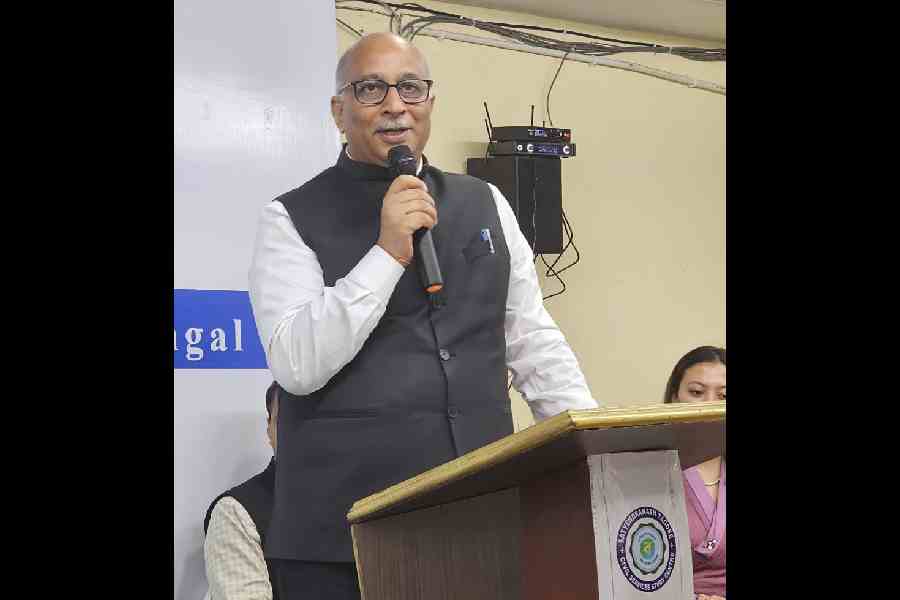The Election Commission on Wednesday set a seven-day deadline for Bengal chief secretary Manoj Pant to comply with its August 5 directive to suspend and lodge FIRs against officials responsible for “irregularities” in electoral roll revision.
“The chief secretary was asked to comply with the order within seven days. When he told the EC that it was not solely on him to implement the directive, the poll body remained firm on its stand,” said a source.
Another official said Pant told the EC that the directive would be implemented once the internal inquiry initiated by the state government against the accused officials was completed.
“The EC was okay with the internal inquiry against the officials, but that should not come in the way of complying with the order,” he said.
Repeated attempts to contact Pant over the phone remained unsuccessful.
Pant was summoned by the EC to Delhi on Wednesday after the state neither suspended nor lodged FIRs against the four officials and a computer operator after it was found that several fictitious names were inserted in the electoral rolls of the Moyna and Baruipur (East) Assembly constituencies over the past month.
On August 8, the EC had asked the Bengal chief secretary to send a compliance report by 3pm on August 11.
In his reply, Pant had informed the EC that the state government had removed the assistant electoral registration officer of Moyna and the data entry operator of Baruipur (East) from poll-related duties and initiated an internal inquiry. He stated that taking stern measures against the identified officers would be harsh before the completion of the inquiry.
However, the EC on Tuesday said it was not satisfied with the chief secretary’s reply and he was summoned to Delhi.
Pant reached Nirvachan Sadan around 4.30pm and left the premises an hour later.
“The commission made it clear that the chief secretary would be given another chance to comply with the order. He was also told that the state cannot delay the EC directive on the pretext of an internal inquiry since the accused officials had admitted their faults during an inquiry by the chief electoral officer of Bengal,” said a source.
“The EC wanted the state government to comply with the order instead of taking action against the chief secretary,” said another source.
The Association of Democratic Reforms (ADR) on Wednesday told the Supreme Court that the Election Commission had, in a “mala fide” manner, replaced a search-enabled PDF of the 7.24 crore-strong Bihar draft electoral rolls with an image PDF format on its website a day after Congress leader Rahul Gandhi alleged “vote theft”.
However, the apex court had in its 2018 judgment in the Kamal Nath versus the EC case ruled that the poll body was not obligated to publish a “searchable pdf” of voter rolls.
The issue was raised by advocate Prashant Bhushan, appearing for the ADR, during the daylong hearing of a batch of petitions challenging the validity of the special intensive revision (SIR) of electoral rolls.
“They (EC) can’t decide citizenship. They can refer the issue to the government but not decide the issue themselves. The EC removed the searchable option in draft rolls exactly one day after Rahul Gandhi did that media conference on August 4,” Bhushan told the bench of Justices Surya Kant and Joymalya Bagchi.
“We have no knowledge of such a media conference,” Justice Kant observed.
Bhushan was referring to the media conference where Rahul alleged large-scale “vote theft” and accused the EC of colluding with the BJP to keep Prime Minister Narendra Modi in power. The Congress leader’s claim has set off a discussion on the integrity of the country’s electoral process.
The BJP had rubbished the allegation, citing the Congress’s victory in Telangana, Himachal Pradesh and Karnataka.
“…The website publication (of voter rolls) is welcome because it’s more accessible...,” Justice Joymalya Bagchi said.
Bhushan accused the EC of carrying out the entire SIR in a mala fide manner, pointing to its refusal to divulge details about the 65 lakh voters whose names were deleted from the draft rolls on the grounds of death, migration or absence of documents.
“The mala fide nature of what the EC is doing is clear…. They refused to accept Aadhaar, ration card, EPIC (Electoral Photo Identity Card) cards, saying it’s not evidence of citizenship,” he submitted.
The EC had earlier said that the list of deleted voters was available with booth-level agents (BLAs).
Bhushan wanted to know why a voter should be compelled to go to the BLA to find out if their name had been deleted or not.










